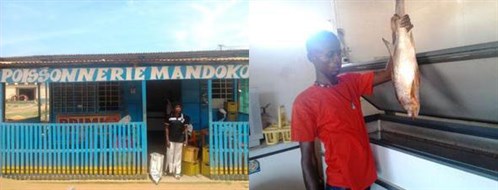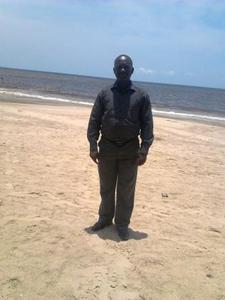11 March 2014
Selling seafood sustains survivor peer support group in Democratic Republic of Congo (DRC)
The Survivor Network Project was launched in 2012 by the International Campaign to Ban Landmines - Cluster Munition Coalition to promote, build and support the collaboration of survivors’ networks in order to develop victim assistance objectives.
The Consortium de Plaidoyer sur l’Assistance aux Victimes (the Consortium for Advocacy on Victim Assistance, CPAV) created a sustainable and inventive peer support project in the region of Moanda, Bas Congo, DRC with support from the ICBL- CMC’s Survivor Networks Project.
CPAV, in the Democratic Republic of Congo (DRC) has been a part of the Survivor Network Project since 2012 and is active in many regions already.
Although Moanda has never been directly affected by the internal conflicts of the DRC, its location – at the border with Angola – made this region the rear base of the rebels and, as a result, a mine-affected area.
Successful clearance efforts led to the province being declared free of mines in 2013. However, nothing had ever been done to bring support to its survivors, until CPAV decided to expand its support to the Bas Congo in late 2013.
The project’s objective is to help landmine survivors and other persons with disabilities overcome trauma and isolation with the psychological support of the peer group.
In November, twenty-five peer volunteers were selected and trained to build and manage a support group in this region where no other assistance was available. Francky Miantuala, Coordinator of the Congolese Campaign to Ban Landmines, conducted the training using the "Four-day Training on Peer support" tool developed by Survivors Corps. Since then, the group has met at least once a month to exchange experiences and build the group cohesion to enhance individual and collective growth.
But this is only one part of CPAV’s Project, whose main goal is to ensure that survivors and persons with disabilities support themselves as fully integrated members of their communities. To meet this goal, capacity building and sustainability were brought together through an income-generating project.

CPAV understood that local survivors should be responsible for all aspects of the project from its inception: from the original design, to implementation, management and its economic sustainability. This is how the idea for an income generating project was established.
Donor funds to support ongoing meetings of the peer support group will end after the end of project in June 2014. In order to keep the meetings going, survivors from Moanda city, a seaside town on the Atlantic Ocean, decided to open a fish shop.
Opening in December 2013, they began to sell fish from the ocean, especially to the tourists coming from big cities to enjoy the beach and fresh food. The shop has three objectives: generating funds to support ongoing participation in peer support activities by covering transport costs; covering urgent needs of members such as school items for their children and primary medical care; and job creation for one of the members of the group, who is paid to run the shop day to day.
A lot has been accomplished since the shop opened just a few short months ago. Survivors have already faced challenges like the instability of the electricity supply in the city. However, they are a resourceful group and are currently considering the pros and cons of purchasing an electric generator versus drying or salting the fish so it can be kept longer.
This project is an example of how resourceful survivors’ networks can be and how they can overcome all kinds of difficulties by coming together - even the most unexpected ones like how to preserve fish in an unstable environment!



